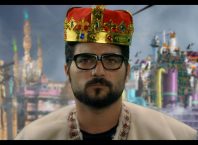By Shlomo Porath
A couple of weeks ago, I was sitting in a café’ with a few friends. At a certain point, the former geography teacher of one of them stopped by to say hello. A religious man in his early 40’s, he joined us while he was waiting for his wife to finish some shopping. He joined our conversation, which had to do with Yom Ha’Shoa and the way it manifests itself in the religious and secular Israeli world. At one point, I used the term ‘person of faith’, which bothered our newest arrival. He said that the only people today talking about religion in public forums are people of faith: some with a faith in the presence of higher forces, some with faith in the absence of such forces. We had a friendly back and forth about the idea. (I associate with a variety of argumentative people)
This was the perfect mind-set for me to be in before viewing ‘Religulous’ last night. The film, a documentary, was directed by ‘Borat’ director Larry Charles, stars comedian Bill Maher (of the TV shows ‘Politically Incorrect’ and ‘Real Time’) and is about religion, that greatest of all sacred cows. Maher is known for being anti-religion and recruited Charles to direct a long series of encounters with people who define themselves as religious.
Upon the film’s premiere last fall at the Toronto film festival, Maher’s antagonism towards all things religious naturally caused some controversy. As is generally the case with films dealing with such touchy subjects, the majority of the criticisms toward the film were proffered by people and groups who hadn’t seen the film. In fact, I was one of those people.
I made up my mind on the film based strictly on what I knew of Maher. The trailer and TV appearances did nothing to alleviate my notions. They made it seem a rather vitriolic and shallow film, intent on nothing more than ridiculing anyone who held to their Jewish, Muslim, and especially Christian beliefs. The film was not distributed here (as is generally the case with documentaries), and I avoided it on DVD for a few months. I finally rented it only because a film critic whose opinion I respect recommended the film, and because I’d seen most of the other 2008 releases people were talking about.
Watching the film was a constant back and forth. For every compelling idea, there were at least 3 cheap shots. For every reasonable and intelligent interviewee, there were at least 5 rather ridiculous people. The film begins in Meggido, the supposed site of Armageddon. Maher immediately sets the stage by putting forth the idea of god bringing a violent end to man-kind, taking a chosen few to be by his side. That is the image Maher wants people to have of religion- Apocalyptic violence. Maher would like us to believe that he is making a film about asking questions; the choice of beginning the film with nothing short of Armageddon (an image Maher expands upon at the end of the film) belies that supposed curiosity.
 That sense, that the curiosity is not entirely genuine, that his ultimate goal is to prove a point, was quite off-putting. No matter how engaging any person interviewed in the film, Maher goes back to underline his thesis. This is not surprising, as a documentary with an agenda is hardly a new thing, but was disappointing to me. Disappointing because the film did such an excellent job of zeroing in and looking at specific aspects of religion, yet generally wrote them off or simply went right on to a next point, which more often than not was making fun of someone for being religious.
That sense, that the curiosity is not entirely genuine, that his ultimate goal is to prove a point, was quite off-putting. No matter how engaging any person interviewed in the film, Maher goes back to underline his thesis. This is not surprising, as a documentary with an agenda is hardly a new thing, but was disappointing to me. Disappointing because the film did such an excellent job of zeroing in and looking at specific aspects of religion, yet generally wrote them off or simply went right on to a next point, which more often than not was making fun of someone for being religious.
That being said…whenever the film did get past its own preconceived notion about the lack of intelligence of anyone who did subscribe to one religion or another, it managed, if only for a moment, to be one of the more engaging and relevant documentaries in recent years. Two interviews in particular stood out for me, both of them of Catholic scholars at the Vatican. One, an astronomer, calmly states that it is indeed true that much of what happens in the Bible is scientifically impossible. The other ridicules the concepts of creationism and hell, and relates that of all the people Italian Catholics pray to, Jesus Christ is sixth on the list, after more issue-specific saints. Instead of prodding deeper, and actually asking how a Catholic scholar working at the Vatican can have faith even though history doesn’t quite mesh with theology, Maher moves on to one of his side-shows, which play like a series of jokes.
“Have you heard the one about the guy who believes he is Jesus’ descendant, as well as his reincarnation? Get this- he says that Jesus bloodline traveled from Nazareth all the way to Puerto-Rico, where he was born!”
“How about the one about the ex-gay priest, who’s now on a mission to show homosexuals the error of their choices?”
“Or the one about the pastor who uses his church’s donations to buy $2000 suits, all the while misquoting the bible to defend his extravagant grooming AND bragging about how many women in his congregation have a crush on him?”
Many of these are quite funny, and these people are indeed quite ridiculous when using religion to argue for their own personal benefit (The title of the film comes from melding the words religion and ridiculous). But not only are these interviews side-shows, amusing excuses not to interview someone who might actually be able to give a good answer to these questions, Maher and director Charles don’t even let these people hang themselves with their words. They insist on sneaking in some cheap shot, mocking subtitles, or cutting to an old biblical epic to show you just how funny these beliefs are. Rarely asking the pertinent questions, and not dealing with the troublesome answers. When a Muslim cleric tells Maher that the Koran preaches peace, and follows it up by stating that the infidels will die, Maher doesn’t even question it, just uses subtitles to imply that the cleric is a terrorist.
 Speaking of non-Christians- the film doesn’t seem too invested in them. According to the film, Muslims are basically all violent people who hate infidels. The only ones presented in positive light are two gay Muslims in a bar in Amsterdam, and they are used simply as an abstraction of how people can be mistreated under Islam. Jews are rather comical in the film. He presents one of the anti-Zionist Rabbis who met with Ahmadinejad, a radical settler, and a man who creates gadgets for religious people to be able to use electrical appliances on the Sabbath. Of course, Maher laughs at the notion that people cannot use fire on the Sabbath, instead of following up on the notion of someone trying to find loopholes out of what he believes to be god’s laws.
Speaking of non-Christians- the film doesn’t seem too invested in them. According to the film, Muslims are basically all violent people who hate infidels. The only ones presented in positive light are two gay Muslims in a bar in Amsterdam, and they are used simply as an abstraction of how people can be mistreated under Islam. Jews are rather comical in the film. He presents one of the anti-Zionist Rabbis who met with Ahmadinejad, a radical settler, and a man who creates gadgets for religious people to be able to use electrical appliances on the Sabbath. Of course, Maher laughs at the notion that people cannot use fire on the Sabbath, instead of following up on the notion of someone trying to find loopholes out of what he believes to be god’s laws.
Around and around it goes, never grabbing on to the truly provocative stuff. It ends, right where I began, back at Meggido. This time, instead of merely implying Apocalyptic violence, Maher out-right says that religion must be abolished before it destroys the world, followed by Charles providing a montage of the world destroying itself because of religion. The ending comes quite abruptly, as if Maher and Charles decided that after 90+ minutes, they have proven their case beyond a doubt.
I was still waiting for them to present a thesis that consists of more than ridiculing ridiculous people. Waiting for them to interview an intelligent theologian, someone articulate who can actually explain why he believes religion has value (I personally don’t believe that even Maher thinks that religious tradition as a whole should be done away with). That’s not what they were looking for. As it is, the documentary stands as an interesting glimpse at a fascinating topic. As annoyed as I am that it does not bring much to the table, it undoubtedly succeeds at being one hell of a conversation starter.
Image credit: Lionsgate Films






Great, dump on the religious “bumpkins” but don’t even try to engage anyone with a brain, you atheists are so pathetic with your atheist=intelligent mantra, for a group that perceives itself as so liberal you guys a very closed minded.
Admit it: smart religious people scare you.
I have to agree with Alan engaging the more erudite and thoughtful members of the religious will only lead to a lot of ineffective Sophistry.
I have not seen the film yet .Thanks for the review.
Well written review, but I feel that to call for a discussion with serious theologians is disingenuous at best. Serious theologians will give “complicated” answers when engaging in a dialog with non-believers but by far prefer simplicity and easy “moral truths” when engaging their own flocks.
Maher was correct to go after the most unsophisticated because they represent the rank-and-file of believers far more than any theologian.
Comments are closed.